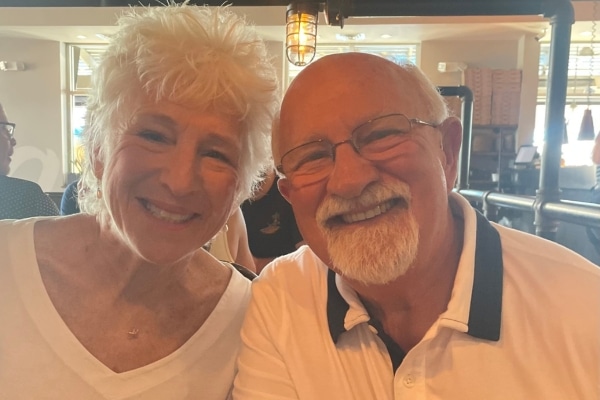Get up to speed on the latest in dementia research with Being Patient’s round-up of news and milestones in Alzheimer’s drug development and brain health clinical trials over the past three months of 2024.
In a recent survey, Being Patient put a question to readers: “What is the biggest barrier preventing you from seeking a trial?” The most common responses included barriers to access, inability to find trials to join, and confusion about how clinical trials work and whether a trial is right for them.
Clinical trials can be a rocky landscape to navigate. To help map out and demystify this space for patients and caregivers, Being Patient sends out a quarterly Trials Update newsletter on the latest research on clinical trials, a database of clinical trials around the world that are actively recruiting, and real accounts from clinical trial participants about their experience. Not signed up yet? Subscribe here, and read on for our July 2024 edition:
It’s been an active couple months in the Alzheimer’s drug development space. Here are the highlights — read on for more details:
- Eli Lilly’s Kisunla which underwent trials under its generic name donanemab, was approved by the Food and Drug Administration at the start of July for treating patients in the earliest stages of Alzheimer’s.
- Coya Therapeutics’ received a $5-million investment for their experimental Alzheimer’s drug from the Alzheimer’s Drug Discovery Foundation.
- Cassava Sciences’ Simufilam: At the end of June, the Department of Justice charged a former paid scientific advisor, Hoau-Yan Wang, with fraud related to the development of simulfilam and a diagnostic test being used in the company’s clinical trials.
Being Patient’s Guide to Monoclonal Antibodies For Alzheimer’s Disease
Disease-modifying small molecule drugs
Annovis Bio’s Buntanetap: Alzheimer’s drug buntanetap is designed to prevent the build up of amyloid and tau in the brain. However, data from its Phase 2/3 trial shows it failed to slow the disease. After the end of the trial, the company conducted additional testing and found that the drug improved cognition in 90 of 325 participants who had Alzheimer’s biomarkers. Annovis only highlighted this positive subset of participants in the press release, and did not publicly release the rest of the data. Another Phase 3 trial in people with early Alzheimer’s and confirmed brain pathology is being planned.
Cassava Sciences’ simufilam: At the end of June, the U.S. Department of Justice charged a former Cassava Sciences consultant with fraud related to the development of the company’s experimental Alzheimer’s drug simufilam, which targets a misfolded protein in the brain. And after an announcement that two unnamed senior employees were also being investigated, the CEO and the SVP of neuroscience both resigned. Phase 3 trials of simufilam are still ongoing with data expected at the end of 2024.
PharmatrophiX’s LM11A-31: In May, drugmaker PharmatrophiX’s experimental Alzheimer’s drug LM11A-31, designed to stimulate nerve growth and stave off cell death, was shown to be safe and well-tolerated in an early Phase 2 trial. While it appeared to reduce key biomarkers, it did not seem to improve cognitive symptoms. (A Phase 3 trial has not yet been announced.)
Alzheon’s Valiltramiprosate: Alzheon completed Phase 3 clinical trials of its experimental Alzheimer’s pill valiltramiprosate (ALZ-801), and has enrolled the first patient in an open-label extension study to gather data on the drug’s long-term effectiveness. The company expects to file for FDA approval by the end of 2024 and has raised a fresh $100 million to help market the treatment if approved.
Disease-modifying biologics: Antibodies, vaccines, cell infusions and more
Eli Lilly’s Kisunla: Kisunla, which underwent trials under its generic name, donanemab, hit the U.S. market, giving patients with early-stage Alzheimer’s two disease-modifying “mab” drug options. Here’s how it differs from its predecessor, Leqembi.
AC Immune’s ACI-24.060: Drugmaker AC Immune announced it will partner with Takeda to conduct a Phase 3 trial of its beta-amyloid vaccine. The drugmaker is still recruiting patients for a 140-person Phase 1/2 study to establish safety, side effects, and ability to affect Alzheimer’s biomarkers, with results expected in 2026.
Coya Therapeutics’ Low-Dose Interleukin-2: Drugmaker Coya Therapeutics announced the completion of its Phase 2 trial testing low-dose interleukin-2 (IL-2) in mild to moderate Alzheimer’s disease and will release results later this year. IL-2 is a naturally produced immune-modulating protein.
Coya Therapeutics’ COYA-302: Coya is also developing a combination treatment called COYA-302, composed of IL-2 and an immunosuppressive antibody called CTLA4-Ig. This combination enhances the abilities of T-reg cells, which work to reduce inflammation while also suppressing inflammation caused by other types of immune cells.
Eisai and Biogen’s Leqembi: Eisai and Biogen applied for FDA approval of a version of their anti-amyloid drug which could be administered at home using a device similar to an insulin pen. The FDA is set to issue a decision by early 2025.
NK Gen Biotech’s SNK01: NK Gen Biotech announced clearance from the FDA to commence a Phase 2 trial testing their treatment in moderate Alzheimer’s patients. Unlike other drugs, SNK01 is made of a powerful subtype of Natural Killer (NK) immune cells that are extracted, amped up in the lab, then re-infused to attack amyloid, tau, and other signs of cell damage or inflammation.
Treatments for Alzheimer’s psychiatric symptoms
As many as half of people who develop Alzheimer’s dementia experience agitation. Others develop anxiety or depression. Some drugmakers are working on treatments to ease or alleviate these behavioral symptoms for patients in the later stages of the disease.
Otsuka’s AVP-786: After failing to show the drug reduced agitation in Alzheimer’s patients in Phase 3 trials, drugmaker Otsuka announced in May that it had terminated the development of AVP-786.
IGC Pharma’s IGC-AD1: IGC Pharma announced the enrollment of the first two patients in its 164-person Phase 2 clinical trial to treat agitation in Alzheimer’s disease. Results are expected in mid-2015. The company’s drug is a formulation of THC, one of the active components of cannabis.
Neuromodulation headsets
Cognito Therapeutics’ SPECTRIS: Cognito Therapeutics has developed the Spectris headset, which uses a specific frequency of flickering lights and sounds to stimulate brain activity. In April, the company announced that its device showed durable effects preserving brain volume and activities of daily living over the course of 18 months in an open-label extension study. The company is recruiting for its Phase 3 trial and expects to receive results by the end of 2025.





is there any chance of a clinical trial for the light and sound at 20 Hz treatment being held in the UK?
My husband just completed 18 mos in a Phase 2 trial funded by Biogen that was focused on the tau protein build up in the brain. He is now on long term extension as results from phases 1 & 2 were promising enough to move onto phase 3. I did not see anything about this trial in your newsletter.
Hi Madeline, we reported on Biogen’s trial. You can find information about Leqembi within the article and within our most recent edition of the Trials Update here: https://www.beingpatient.com/trials-update-2025-q1/ – take care.